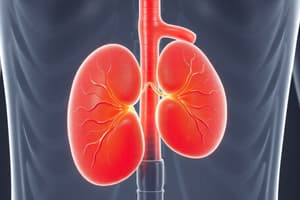Podcast
Questions and Answers
What are the two portions that make up each adrenal gland?
What are the two portions that make up each adrenal gland?
The adrenal gland is composed of the adrenal medulla and the cortex.
What hormones are produced by the adrenal medulla?
What hormones are produced by the adrenal medulla?
The adrenal medulla produces epinephrine (adrenaline) and norepinephrine.
Under what circumstances are epinephrine and norepinephrine released?
Under what circumstances are epinephrine and norepinephrine released?
Epinephrine and norepinephrine are released under the state of emergency, influenced by the sympathetic nervous system.
Match the following parts of the adrenal gland with their descriptions:
Match the following parts of the adrenal gland with their descriptions:
Match the following hormones with their sources:
Match the following hormones with their sources:
Match the following terms with their definitions:
Match the following terms with their definitions:
Match the following parts of the adrenal gland with their descriptions:
Match the following parts of the adrenal gland with their descriptions:
Match the following terms with their definitions:
Match the following terms with their definitions:
Match the following hormones with their sources:
Match the following hormones with their sources:
Which portion of the adrenal gland produces epinephrine and norepinephrine?
Which portion of the adrenal gland produces epinephrine and norepinephrine?
What is the main function of epinephrine and norepinephrine in the body?
What is the main function of epinephrine and norepinephrine in the body?
What are the two major types of hormones produced by the adrenal cortex?
What are the two major types of hormones produced by the adrenal cortex?
True or false: Each adrenal gland is composed of an inner portion called the adrenal medulla and an outer portion called the cortex.
True or false: Each adrenal gland is composed of an inner portion called the adrenal medulla and an outer portion called the cortex.
True or false: Epinephrine and norepinehrine are produced by the adrenal medulla.
True or false: Epinephrine and norepinehrine are produced by the adrenal medulla.
True or false: Over secretion of epinephrine and norepinephrine may cause hypertension and aggressive behavior during routine life.
True or false: Over secretion of epinephrine and norepinephrine may cause hypertension and aggressive behavior during routine life.
What are the two major types of hormones produced by the adrenal cortex?
What are the two major types of hormones produced by the adrenal cortex?
What are the main functions of epinephrine and norepinephrine in the body?
What are the main functions of epinephrine and norepinephrine in the body?
What is the potential consequence of over secretion of cortical hormones?
What is the potential consequence of over secretion of cortical hormones?
What are the effects of epinephrine and norepinephrine in the body?
What are the effects of epinephrine and norepinephrine in the body?
What are the two major types of hormones produced by the adrenal cortex?
What are the two major types of hormones produced by the adrenal cortex?
What are the consequences of over secretion of cortical hormones?
What are the consequences of over secretion of cortical hormones?
Match the following hormones with their effects in the body:
Match the following hormones with their effects in the body:
Match the following conditions with their corresponding hormonal imbalances:
Match the following conditions with their corresponding hormonal imbalances:
Match the following terms with their descriptions:
Match the following terms with their descriptions:
Match the following hormones with their effects in the body:
Match the following hormones with their effects in the body:
Match the following conditions with their corresponding hormonal imbalances:
Match the following conditions with their corresponding hormonal imbalances:
Match the following adrenal gland parts with their functions:
Match the following adrenal gland parts with their functions:
Flashcards are hidden until you start studying
Study Notes
Adrenal Glands
- Located atop each kidney, essential for stress response and metabolism.
- Composed of two main parts: adrenal medulla (inner) and adrenal cortex (outer).
Adrenal Medulla
- Produces epinephrine (adrenaline) and norepinephrine.
- Hormones released during emergency situations, governed by the sympathetic nervous system.
- Both hormones play crucial roles in the body's immediate stress response.
- The synergistic effect means they work together but have distinct actions:
- Epinephrine increases metabolic activity, dilates bronchi, and boosts blood flow to muscles and heart.
- Norepinephrine primarily causes peripheral vasoconstriction, elevating blood pressure.
Effects of Hormonal Secretion
- Oversecretion:
- May lead to hypertension (high blood pressure).
- Can cause aggressive behavior in daily life.
- Undersecretion:
- Results in inability to effectively respond to emergencies.
Adrenal Cortex
- Produces two major hormone types:
- Glucocorticoids (e.g., cortisone): Regulate blood glucose levels.
- Mineralocorticoids (e.g., aldosterone): Control mineral levels in the blood.
- Production of both types is influenced by ACTH (Adrenocorticotropic hormone).
Disorders Related to Hormonal Secretion
- Addison's Disease:
- Resulting from undersecretion of cortical hormones.
- Characterized by general metabolic disturbance, muscle weakness, and salt loss.
- Cushing's Disease:
- Caused by oversecretion of cortical hormones.
- Leads to excessive protein breakdown and resulting muscle and bone weakness.
Additional Hormones
- Androgens (testosterone) are produced in small amounts by the adrenal cortex in both males and females.
- Major site of testosterone secretion is the testes, the male gonads.
Studying That Suits You
Use AI to generate personalized quizzes and flashcards to suit your learning preferences.




